Core i7-8700K Review: Coffee Lake Brews A Great Gaming CPU
Why you can trust Tom's Hardware
Scientific & Engineering Computations, & HPC Performance
For these tests, we’re using the SPECwpc benchmark suite for workstations with its wide variety of tasks. It tests a number of very different mathematical computations optimized for parallelization. They typically make heavy use of available memory bandwidth and cache, plus expose issues with latency.
Rodinia
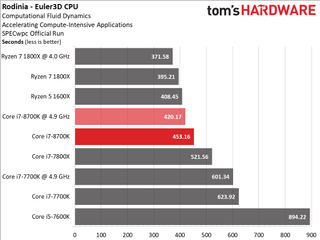
The pre-Euler3D CFD test (Computational Fluid Dynamics benchmark) runs very well on AMD's CPUs, suggesting scaling based predominantly on core count. Intel's overclocked CPUs do pick up some performance compared to the stock configurations, but they can't keep up with Ryzen 7 1800X.
Convolution
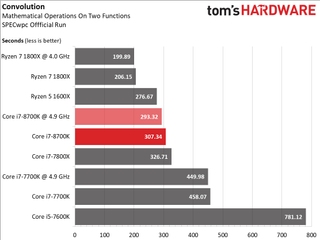
In this benchmark, a mathematical operation is performed on two functions (convolution), which results in a third function. Performance scales according to core count. Clock rate has far less impact.
CalculiX
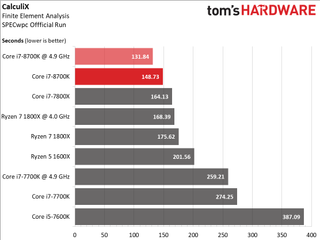
This test is based on the finite element method for three-dimensional structural computations. Intel’s higher frequencies help Core i7-8700K beat out Ryzen 7 1800X, though core count clearly matters as well.
Poisson's Equation
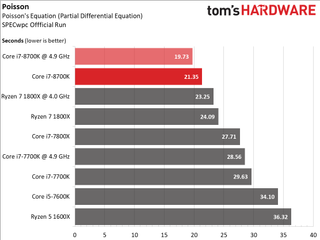
Poisson's Equation is a second-order partial differential equation widely used in physics for boundary value problems.
Intel’s new six-core processors fare well. Higher clock rates don't appear to help much, given our overclocked results.
Sequential Reweighted Message Passing (SRMP)
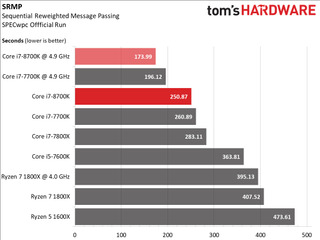
These are algorithms for discrete energy minimization. The workload benefits from core count, clock rate, and architectural improvements, it appears. For some reason, though, AMD's Ryzen 7 and 5 just don't show well, even though our logs show them to be fully utilized.
Kirchhoff Migration
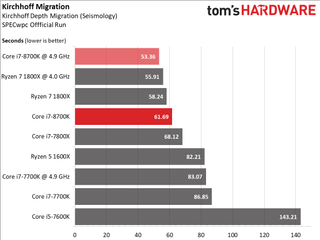
The earth’s subsurface structure can be determined via seismic processing. One of the four basic steps in this process is the Kirchhoff Migration, which is used to generate an image based on the available data using mathematical operations.
This benchmark and its underlying computations turn out to be a great fit for AMD. Intel's Core i7-8700K only takes the top spot after aggressive overclocking, and that wouldn't be practical for everyday use. Ultimately, AMD’s Ryzen 7 1800X wins in stock trim.
In the end, Core i7-8700K performs well in almost every scenario, especially when the workload scales according to core count and clock rate. Higher frequencies help Intel fend off AMD's eight-core competition, though Coffee Lake represents a compromise in certain tasks.
MORE: Best CPUs
MORE: Intel & AMD Processor Hierarchy
MORE: All CPUs Content
Current page: Scientific & Engineering Computations, & HPC Performance
Prev Page CPU Computing & Rendering Performance Next Page Overclocking, Cooling & TemperatureStay on the Cutting Edge
Join the experts who read Tom's Hardware for the inside track on enthusiast PC tech news — and have for over 25 years. We'll send breaking news and in-depth reviews of CPUs, GPUs, AI, maker hardware and more straight to your inbox.
-
cknobman Looks like it might be time for AMD to lower prices.Reply
AMD really has shaken Intel up, never would I have dreamed (before this year) I'd see Intels best gaming cpu (especially a K model) release at $360. -
AgentLozen AMD's price per core is still very strong. It struggles in gaming at 1080p but Tomshardware didn't provide data in 1440p or 4K.Reply
I'm not yet convinced that AMD is in trouble. -
saunupe1911 Hmmm is it worth a skylake 6700K that's stable at 4.6 Overclock to upgrade? Probably not. I wouldn't mind 6 cores though. I wonder how many will hit 5.0!Reply -
jroc188 8700k is $480ca got the R5 1600 for $255ca and mobo for $120ca. $375 all together and more then happy with the gaming results. But the 8700k dose look sweet on the benchmarks. AMD with a price drop will still sell wellReply -
shrapnel_indie ReplyOf course, while Intel's accelerated Coffee Lake-S launch makes it look today's unveiling is a direct response to heated competition, in reality, the long incubation period for new processors means it’s more likely the result of 10nm manufacturing delays.
Ummm... Yeah, the design may have been kicking around, and ready to go before Ryzen, but when it is released months earlier than scheduled.... Saying that it wasn't a response to Ryzen seems more like misinformation more than pure fact. Yeah, I don't doubt 10nm manufacturing delays played a part in the previous release date, but Ryzen forced its release a little earlier than planned. -
bloodroses To AMD fanbois who claimed that Intel was toast and couldn't respond to Ryzen's release, here's Intel's Mic drop. *thud*Reply
For the rest of us consumers, this is great news for continued strong competition at reduced prices from both companies. :) -
massacre.h4te Nearly 90 degrees Celsius when overclocked gaming on an AiO. Prettttttty toasty!Reply -
saunupe1911 Reply20241606 said:To AMD fanbois who claimed that Intel was toast and couldn't respond to Ryzen's release, here's Intel's Mic drop. *thud*
For the rest of us consumers, this is great news for continued strong competition at reduced prices from both companies. :)
Z370 motherboards are expensive though...sheesh. And you gotta reach out to liquid cooling companies for attachments for mounting to this socket. Canon Lake may be out before you can get everything situated for a nice 8700k upgrade lmao. -
FormatC Reply
The reason is simple:20241615 said:Nearly 90 degrees Celsius when overclocked gaming on an AiO. Prettttttty toasty!
The built-in frying fat between IHS and die :) -
LilDog1291 Reply20241606 said:To AMD fanbois who claimed that Intel was toast and couldn't respond to Ryzen's release, here's Intel's Mic drop. *thud*
For the rest of us consumers, this is great news for continued strong competition at reduced prices from both companies. :)
I don't know if I would call 90C+ on a chiller cooler (granted its a high overclock but the 7700k had the same problem) a mic drop but it is definitely a step in the right direction. If they can get their temperatures under control in the next generation they will win my vote back.
